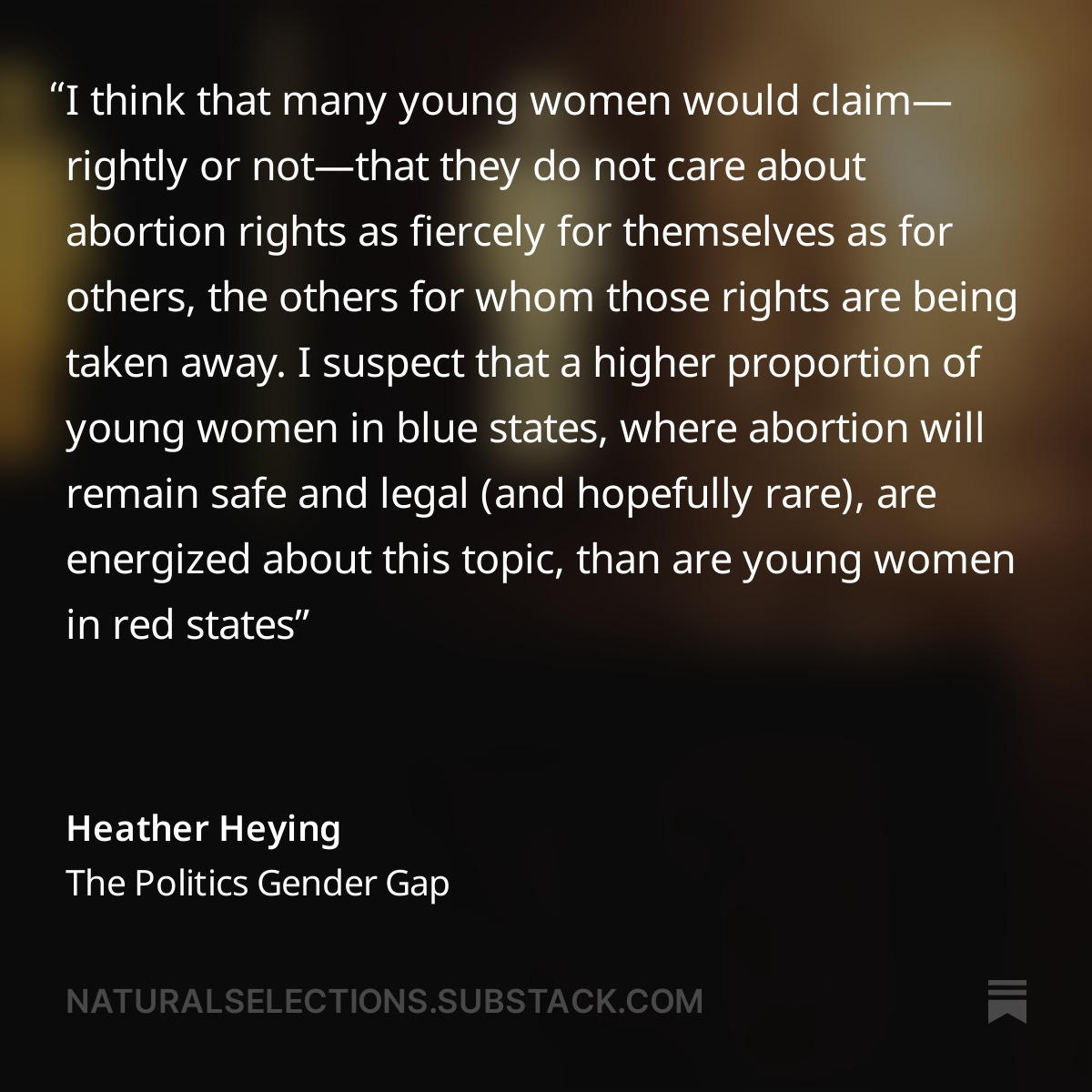"Protecting" Women Everywhere Even When Unwanted
Democrats are more likely to try to "protect" Red-State's women's "rights" to abortion
I was going to cross-post the following article with a note, but my note was a little bit long and Substack wouldn't let me do it. You can read the article that I am referencing here:
I wanted to write about this particular portion of the article, but the whole article is worth reading and not long.
Heather Heying wrote:
I think that many young women would claim—rightly or not—that they do not care about abortion rights as fiercely for themselves as for others, the others for whom those rights are being taken away. I suspect that a higher proportion of young women in blue states, where abortion will remain safe and legal (and hopefully rare), are energized about this topic, than are young women in red states, where abortions have indeed become more difficult to access. I suspect this, but do not have the data to back it up.
A lot of the ads or pro-abortion material I’ve seen or heard seem to have that connotation, that they’re protecting others. Some women may yell at protests about their own rights. But the ads are usually about protecting others. I would highly suspect that Heather is right, this is the case, that the women in blue states care more than the women in red ones.
The women in red states will likely take more personal responsibility (use birth control, abstinence, etc.). They may plan things out in advance and already know a way to get access to another state where it’s legal because they take personal responsibility for what happens (even in the case of emergencies like rape). Compared to Democrats Republicans are more into personal responsibility than to fall into feeling like a “Victim”. And even if the women live in a red state but are not Republican, in the state there is a local society that expects a certain level of accountability and responsibility. Republicans have more of an internal locus of control, rather than an external locus of control. Democrats have more of an external locus of control, believing things happen TO them like they have no control over the situation.
A Republican woman’s fear of an unwanted pregnancy is not as large as the fear of a pro-abortionist from a blue state because when you take responsibility you feel powerful. Democrats tend to ignore personal responsibility and immediately see themselves (and others) as “Victims” so they feel powerless and thus more afraid.
Because Democrats often see through the Drama Triangle lens more than others, they also take on the “Savior” role and try to get out of the vote to protect the women in red states whether or not they actually want help. And Republican women may not want help. They may be voting to keep it illegal (to protect innocent babies). The women still have a desire to protect, but they view the fetus as more innocent and deserving of protection than the woman in most abortion cases (excluding things like rape).
Those who play the “Savior” role don’t care what the supposed “victims” want though. They just want to look like a good protector.
BTC Donation Address: bc1q4s6h8rhyqawqlz46ppc3zc5v43duycp8m57h9p





I completely understand your point. Although it's awful to hear about women dying in those states or facing death, I'm very hesitant to believe that the women in the state feel as though they need their rights to abortion to be protected. In fact, many of them didn't care or actively voted for politicians who would usher policies like this in. I believe that if women in red states feel so strongly about protecting their rights to abortion, they need to take responsibility and do what they need to do to make sure those rights are protected.
Interesting.
Something to ponder: Perhaps young women (16 to 18?) are more concerned because of parental pressure? Scenario: young woman in "red state" where even though they are responsible and thinking about possibilities, they might still be terrified of getting pregnant even though they have taken precautions and they may not have parental support to obtain an abortion in a neighboring state.